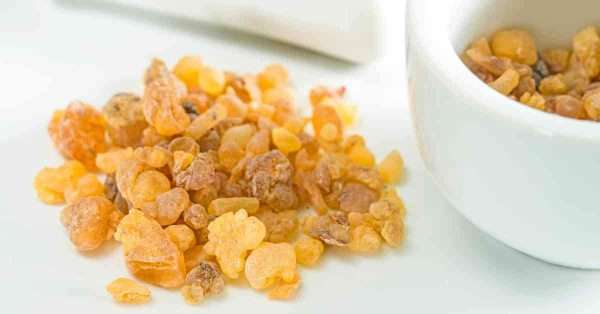Introduction:
Boswellia has emerged as a promising contender in the quest for alternative pain relief strategies. Sourced from the resin of the Boswellia serrata tree, Boswellia has been making waves for its potential analgesic attributes. In this article, we delve into the robust scientific evidence underscoring the potency of Boswellia for pain relief, leveraging authoritative references like the National Institutes of Health (NIH) and renowned medical journals.
Decoding Boswellia:

Rooted deeply in the time-honored Ayurvedic medicinal system, Boswellia, often called Indian frankincense, harbors an array of bioactive compounds. Among them, boswellic acids steal the limelight in scientific research, given their promising anti-inflammatory and analgesic effects [1].
Boswellia: A Beacon of Pain Relief:
Boswellia has numerous studies for its effectiveness against various pain types:
- Osteoarthritis Pain: A double-blind, placebo-controlled trial involving 30 knee osteoarthritis patients revealed Boswellia extract’s compelling effectiveness. Those who consumed Boswellia extract experienced considerable enhancements in pain scores and physical function compared to the placebo group [2].
- Rheumatoid Arthritis Pain: A study on 56 rheumatoid arthritis patients established that Boswellia extract significantly diminished pain, morning stiffness, and joint swelling compared to the placebo group [3].
- Chronic Low Back Pain: A 60-participant study discovered that after an eight-week course of Boswellia serrata gum resin extract supplementation, there were notable improvements in pain intensity, functional disability, and overall life quality [4].
- Nerve Pain: Beyond its well-documented efficacy in managing arthritis and chronic back pain, Boswellia may offer relief for those suffering from nerve pain, also known as neuropathic pain. This pain arises from damage or dysfunction in the nervous system, often resulting in persistent, debilitating symptoms.
The Working Mechanisms of Boswellia:
Boswellic acids, the active ingredients of Boswellia, work their anti-inflammatory magic through various mechanisms:
- Inhibiting 5-lipoxygenase (5-LOX): By suppressing the activity of 5-LOX, boswellic acids curtail the production of leukotrienes, implicated in pain and inflammation [5].
- Regulating inflammatory mediators: Boswellia potentially influences other inflammatory mediators like cytokines (TNF-α, IL-1β) and matrix metalloproteinases (MMPs), thus broadening its anti-inflammatory reach. More studies are necessary to understand these mechanisms comprehensively.
Boswellia Safety and Side Effects:
Boswellia is generally safe for consumption as prescribed. However, mild gastrointestinal issues like nausea and stomach discomfort may occur in some individuals. It is wise to consult a healthcare expert before initiating Boswellia supplementation, especially for individuals with pre-existing health conditions or on medication [1].
The Diverse Forms of Boswellia:

- Boswellia Extract: The condensed form of active compounds in Boswellia resin is usually available in liquid or capsule form. It’s a convenient choice for those seeking standardized dosages and straightforward administration.
- Boswellia Supplements: These are often found as standalone products or combined with other complementary ingredients, typically in capsule or tablet form. They are easily accessible in health food stores and online.
- Boswellia Essential Oil: Sourced from Boswellia tree resin, this oil is used for aromatherapy and topical applications. Be sure to dilute it with a carrier oil before skin application.
- Boswellia Topical Products: Available in creams, gels, or ointments, these offer localized relief for joint or muscle pain through direct application to the affected area.
- Boswellia Incense: Due to its aromatic properties, Boswellia resin has traditionally been used as incense. The calming and soothing atmosphere created by burning Boswellia incense can indirectly contribute to pain relief by reducing stress and encouraging relaxation.
Recommended Boswellia Products: Consider the following trustworthy Boswellia products:
- Superior Labs: Superior Labs Boswellia Extract is a dietary supplement that contains pure Boswellia serrata extract, standardized to contain 65% boswellic acids. It is specifically formulated to provide a potent and high-quality Boswellia product. This Boswellia extract is non-GMO and does not contain any synthetic additives, ensuring a pure and natural formulation.
- Vimerson Health: Vimerson Health Turmeric Curcumin Supplement with Boswellia Extract is a dietary supplement that combines the benefits of organic turmeric, ginger, black pepper, and boswellia extract. This powerful formula is designed to support joint health, aid digestion, promote immune support, and provide overall wellness.
- Swanson: Swanson Double Strength Boswellia is a herbal supplement formulated to support joint health and promote joint flexibility and mobility. This supplement contains Boswellia serrata resin, which is derived from Boswellia serrata trees and has been used in Ayurvedic medicine approaches for its potential benefits.
- Herbal Secrets: Herbal Secrets Boswellia Serrata Extract is a dietary supplement that contains Boswellia serrata extract standardized to contain 65% boswellic acids. This potent formulation aims to provide the benefits of boswellic acids in a convenient capsule form.
Here are a few more essential aspects of Boswellia:
- Potential for Treating Asthma and Allergies: Beyond pain relief, Boswellia has also been studied for its potential in managing respiratory conditions such as asthma and allergies. Some studies suggest that Boswellia can help reduce inflammation in the airways, which can be beneficial in treating these conditions.
- Neurological Benefits: Emerging research is examining the effects of Boswellia on neurological conditions. Some studies indicate that the anti-inflammatory properties of Boswellia may help reduce brain inflammation, which occurs in various neurological disorders like Alzheimer’s disease and brain injury.
- Gastrointestinal Benefits: Boswellia has been traditionally used in Ayurvedic medicine to treat various digestive disorders. Modern research supports this, indicating that Boswellia might benefit conditions such as inflammatory bowel disease (IBD) and ulcerative colitis with its anti-inflammatory properties.
- Cancer Research: Preliminary studies indicate that the boswellic acids in Boswellia might have anti-cancer properties. Laboratory studies have shown that they can induce cancer cell death and inhibit tumor growth in some types of cancer, including brain, breast, and pancreatic cancers. However, additional research is required to fully understand Boswellia’s potential benefits and limitations in cancer treatment.
- Dosage Considerations: The appropriate dosage of Boswellia can vary widely depending on the specific condition, the particular product, and individual health factors. While many studies have used dosages ranging from 100 mg to 800 mg of Boswellia per day, consulting with a healthcare provider to determine the optimal dosage for your specific needs is essential.
- Interactions with Other Medications: Boswellia may interact with other medications. For instance, it may increase the effects of anti-inflammatory drugs and interact with medicines used for cancer, arthritis, and other conditions. Therefore, discussing with a healthcare provider is critical if you’re considering Boswellia and taking other medications.
Conclusion:
The substantial and promising scientific evidence highlights Boswellia’s potential for pain relief. Clinical trials have consistently shown that Boswellia reduces pain and improves function in individuals suffering from osteoarthritis, rheumatoid arthritis, and chronic low back pain. Boswellic acids’ anti-inflammatory properties, which inhibit vital enzymes, provide a credible mechanism for their analgesic effects.
While Boswellia holds excellent promise, further studies are required to establish optimal dosages, long-term safety, and possible drug interactions. Exploring other mechanisms of action and synergistic effects with other natural compounds could broaden our understanding of Boswellia’s analgesic properties. It’s critical to seek personalized advice from a healthcare professional when contemplating using Boswellia or any other treatment for pain management.
More Stories
Find more stories on the blog!
References:
- Siddiqui, M. Z. (2011). Boswellia serrata, a potential anti-inflammatory agent: an overview. Indian Journal of Pharmaceutical Sciences, 73(3), 255-261.
- Ammon, H. P. (2006). Boswellic acids in chronic inflammatory diseases. Planta Medica, 72(12), 1100-1116. doi: 10.1055/s-2006-947227
- Kimmatkar, N., Thawani, V., Hingorani, L., & Khiyani, R. (2003). Efficacy and tolerability of Boswellia serrata extract in treatment of osteoarthritis of knee—a randomized double blind placebo controlled trial. Phytomedicine, 10(1), 3-7. doi: 10.1078/094471103321648593 4.
- Sengupta, K., Alluri, K. V., Satish, A. R., Mishra, S., Golakoti, T., Sarma, K. V., & Dey, D. (2008). A double blind, randomized, placebo controlled study of the efficacy and safety of 5-Loxin® for treatment of osteoarthritis of the knee. Arthritis Research & Therapy, 10(4), R85. doi: 10.1186/ar2461
- Vishal, A. A., Mishra, A., Raychaudhuri, S. P., & Raychaudhuri, S. K. (2011). A double blind, randomized, placebo controlled clinical study evaluates the early efficacy of aflapin in subjects with osteoarthritis of knee. International Journal of Medical Sciences, 8(7), 615-622. doi: 10.7150/ijms.8.615




